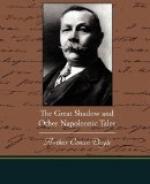There were two deep red puckers in it, one just below the collar bone, and the other about half-way down on the right side. The skin of his body was extremely white up to the brown line of his neck, and the angry crinkled spots looked the more vivid against it. From above I could see that there was a corresponding pucker in the back at one place, but not at the other. Inexperienced as I was, I could tell what that meant. Two bullets had pierced his chest; one had passed through it, and the other had remained inside.
But suddenly he staggered up to his feet, and pulled his shirt to, with a quick suspicious glance at us.
“What have I been doing?” he asked. “I’ve been off my head. Take no notice of anything I may have said. Have I been shouting?”
“You shouted just before you fell.”
“What did I shout?”
I told him, though it bore little meaning to my mind. He looked sharply at us, and then he shrugged his shoulders.
“It’s the words of a song,” said he. “Well, the question is, What am I to do now? I didn’t thought I was so weak. Where did you get the water?”
I pointed towards the burn, and he staggered off to the bank. There he lay down upon his face, and he drank until I thought he would never have done. His long skinny neck was outstretched like a horse’s, and he made a loud supping noise with his lips. At last he got up with a long sigh, and wiped his moustache with his sleeve.
“That’s better,” said he. “Have you any food?”
I had crammed two bits of oat-cake into my pocket when I left home, and these he crushed into his mouth and swallowed. Then he squared his shoulders, puffed out his chest, and patted his ribs with the flat of his hands.
“I am sure that I owe you exceedingly well,” said he. “You have been very kind to a stranger. But I see that you have had occasion to open my bag.”
“We hoped that we might find wine or brandy there when you fainted.”
“Ah! I have nothing there but just a little—how do you say it?—my savings. They are not much, but I must live quietly upon them until I find something to do. Now one could live quietly here, I should say. I could not have come upon a more peaceful place, without perhaps so much as a gendarme nearer than that town.”
“You haven’t told us yet who you are, where you come from, nor what you have been,” said Jim bluntly.
The stranger looked him up and down with a critical eye:
“My word, but you would make a grenadier for a flank company,” said he. “As to what you ask, I might take offence at it from other lips; but you have a right to know, since you have received me with so great courtesy. My name is Bonaventure de Lapp. I am a soldier and a wanderer by trade, and I have come from Dunkirk, as you may see printed upon the boat.”
“I thought that you had been shipwrecked!” said I.




